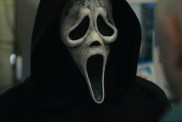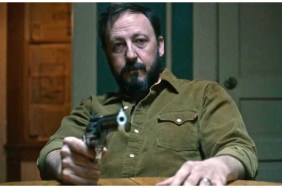For years, Eli Roth’s name has often been mentioned in the same sentence as that of Hollywood recluse Quentin Tarantino, whether it’s the latter’s involvement in “presenting” Roth’s breakthrough horror flick Hostel or Roth’s brief appearance in Tarantino’s Death Proof.
In Tarantino’s new WWII flick Inglourious Basterds, that relationship is taken to the next level as Roth has been cast in the key role of Sgt. Donny Donowitz, one of the elite group of soldiers led by Brad Pitt’s Lt. Aldo Rayne. Known far and wide as “The Bear Jew,” Donowitz is a baseball bat-wielding whacko from Boston whose M.O. involves using said bat to beat the living Hell out of any Nazi he encounters. The plot involves the “Basterds” taking part in a secret mission to blow up a movie theater where Germany’s top leaders have congregated for a movie premiere.
Besides playing Donny, Roth also directed the movie-within-a-movie “Nation’s Pride,” which is premiering at the theater where all those Nazis are convening, starring award-winning German actor Daniel Brühl as German’s top sharpshooter.
A few weeks back, ComingSoon.net got on the phone to talk to Roth about his debut as a serious actor as well as the making of “Nation’s Pride.”
ComingSoon.net: It’s hard to believe it’s been two years since “Hostel: Part II.” When did you shoot this movie within that period?
Eli Roth: This started in July of last year, exactly a year ago. I started preparing for the role and training for the role, and I put on 35 pounds of muscle for the part as a featured character and then we kinda went to Berlin and was there for six months. It was kind of a year after “Hostel 2.”
CS: Did Quentin give you a lot of notice while he was writing it that he might have a role for you?
Roth: He was hinting about it around Thanksgiving of 2007, but he wasn’t sure what “Inglourious Basterds” was going to be at that point. Maybe it was going to be a mini-series. Then over New Year’s 2007-2008, we went to Iceland together and kind of at the end of that, he said, “I think I’m going to write ‘Inglourious Basterds’ as a feature.” Then in April 2008, he was at my Passover Seder, and he’d never really seen me as a Jew before. He knew I was Jewish, but I’m not very religious, but he’d never seen me in that environment. All my friends from Massachusetts were there, and my family, and we were jokingly doing the Passover Seder in our Boston accents. Quentin told me later, “You know, I’ve been writing Donowitz and I’ve been hearing your voice in my head and picturing you doing it. I think you would be a great Donnie. I really think you’ll be great.” So he’d been talking about it, but I figured, “Alright, he’s going to change his mind and who knows what the results are going to be.” Originally, he had Adam Sandler in mind. All of a sudden on July 2nd he gave me the script and then he was auditioning people, but he was not auditioning me, and it turns out that I already had the role, and he was just auditioning people to see if there was anyone who he liked better than me. And then eventually, we sat down in the middle of July and he said, “Look, we’re going to Berlin, but Donowitz has to be a real 360 degree character. We can’t just choke our way through it; this is real acting.” I said, “Well, Quentin, I would love to do that work and really prepare the character and do it right, but I want to know if I have the role first.” He was like, “No, no, no, you got the role!” And I said, “Wait, wait, you’re telling me that I have the role and I’m going to be starring with Brad Pitt in the movie?” He goes, “Yeah” and I was like “Should we make a toast?” And he’s like “Yeah, cheers. Listen, I really want Donowitz to be played as if it was no big deal.” He had already made the decision so that was that.
CS: You’ve done a bit of acting, but it’s always been small scenes, so have you talked with any of the actors you’ve worked with to find out what they do to prepare for a role? Obviously, it involves a lot of time before actually shooting.
Roth: As a director, you have to know what actors are doing. You’re the one telling them what to do. The actors’ job is to come prepared to the set, but sometimes, if they’re beginning actors or people who are non-actors, you have to teach them how to act. I’d never done acting myself other than acting like I’m interested in some studio executive’s notes (Oh, snap!) but beyond that, I knew what to do. I’d just never done it on that level before. Any kind of acting I’d done before, it was just joking around, like having fun with friends. A little cameo here and there, and I never considered it real serious acting, but it was something I was always interested in and always wanted to do, but my passion is directing. That’s what I’ve always loved, but here I am presented with this incredible opportunity, and I said that if I’m going to do this, I can’t just do a good job, it has to be great, and I have to do something so unique and spectacular that people will see it and feel that nobody else could have possibly done the role, which is Quentin feels. I can’t let him down. And I already know how people are going to feel about me. They know I’m friends with Quentin, and they’re going to think I got a free pass doing this, and I know that Quentin’s got a lot of friends and he’s only going to cast people that he feels is best for the part. I always wanted people to come out of the movie excited to see more from me. I don’t want them to go, “Okay, he didn’t f*ck up the film.” I want them to go, “Wow, we had no idea he could do that. I can’t wait to see what he does next.”

CS: At least it’s not like M. Night Shyamalan where you’re making your own movie and you giving yourself a main role.
Roth: Look, I like M. Night very much but I think when directors who are not established actors give themselves big roles in movies, people can walk into the movie with a strike against it, and that’s why I’ve never done that beyond small cameos. Even then, I don’t even take credit for it, I use a fake name, but Quentin said to me, “Look, Eli, you have another career if you want it. If you want to be a movie star, you’ve got it. You really can do it, and you’re great at it, but I don’t want to detract you from what I think you were meant to do, which is direct. You don’t have to worry about that.” How is it going to get better than this? Working with Brad Pitt, cast with the greatest actor in the world, working with Quentin, the greatest director and we’re the closest friends. I’m never going to have a better experience. He said, “No, but now you’ve permission to write yourself a part, to write a great role for yourself that you can act in. You’ve held your own opposite Brad Pitt on screen and you’ve done a great job for me, so you have nothing more to prove as an actor. You can do it now.” And that really freed me up creatively, thinking, “Well, yeah, you know what? Now if there’s a part in a movie that I want to do and I want to write for myself then I’ll do it. I’ll write a big part. And if I want to act in another movie, I’ll do it, but only if it’s something that I like so much that it actually stops me from directing.”
CS: Do you actually see yourself going to do the auditions if you really want to get a part?
Roth: Never. I didn’t audition for Quentin Tarantino and he cast me against Brad Pitt. I’m not auditioning for anybody. I have no interest. I only have interest… if people want me for a part, if it’s a director I really respect, I would meet with that director, but that’s not who I am, that’s not what I do. I’m a director, and even though I love acting, I have no interest in that whatsoever. I’m not interested in going after a part. I think if someone wants me for a part and approaches me then I’ll take it on a case-by-case basis and see what that part is. Generally, I’m really only going to write parts for myself or work with directors I really respect, or it has to be some really spectacular project.
CS: At this point, I haven’t see the movie, only the trailer, but I understand that Donny has a baseball bat and he hits Nazis in the head and then scalps them. Is there more to the character than that? He’s from Boston I assume.
Roth: Yeah, there were sequences we shot with him in Boston, but I don’t know if those ultimately ended up in the film. Who knows where those scenes might land? I haven’t seen the final cut of the film but there’s a lot of stuff that everybody shot, character back story stuff, some of it’s there, some of it’s not. My guy is a guy from Boston who gets every Jew in his neighborhood to sign his baseball bat with the name of somebody they’re worried about in Europe. The thing is that he doesn’t want a machine gun, he doesn’t want to shoot Nazis, he wants to beat them to death with a baseball bat. He wants to feel it in his hands when he’s busy pummeling them to death. This character thinks of himself as a Jewish warrior, who is fighting on the behalf of those who can’t fight and for everyone who can’t be there. When I kill that guy, I didn’t want people to think, “Oh, this is Eli being a psycho with a bat,” I want you to really feel that pain and that rage, which is very real. There were branches of my family that were wiped out in the Holocaust. My roots are from Poland and Austria, Russia, that’s where I’m from, and my grandparents who got out and survived, all the other relatives didn’t and got killed, so it was very real to me. It was a very real, very personal role, and I held a great sense of responsibility in doing it. It wasn’t just an acting job.
CS: At one point, were you going to do some second unit work on the movie as well?
Roth: Yeah. Quentin did a whole film within a film that he had me direct. I offered to Quentin while we were shooting, I said, “Look, if you want to make Cannes and you’re stuck and you need me to do some shots, I’m there. I want to work. I don’t want there to be downtime for me” and he said, “That’s a great offer but I never do 2nd Unit. I do all my own shots, but if you want to do ‘Nation’s Pride,’ there’s only two or three shots I want to do. There’s a specific story and they have to be a certain way but the rest of it is this battle movie. I don’t even know what it is. I can’t even conceptualize it. I’ve got my hands full with ‘Inglourious Basterds’ and I don’t even want to think about ‘Nation’s Pride,'” and I said, “Well, let me do it” and he did. I flew out my brother Gabriel and in two days, we got 130 shots, the whole battle with people falling off buildings and gunshots, then Quentin was so happy, there was a third day he was going to do and he said, “You just do it” and then he was like, “Eli, you just edit it,” so while Sally Menke was cutting the movie, I was in the next room on an Avid. While he was doing these character scenes I’m not in, I went and I cut the movie. I was acting and then sound mixing at night. I gave Quentin five and a half minutes. It’s not coherent, because it’s supposed to be broken up as if you’re watching different scenes from a movie, but I did five and a half minutes of footage and all he needed was thirty seconds, but he said it really helped him conceptualize how he was going to do the ending and rewrite the ending. I was so happy that I was able to give him “Nation’s Pride” ’cause now he has that in his mind’s eye and know, “Okay, when this moment happens, we walk in on this scene. When that moment happens, we walk into that scene.” He was able to really choreograph the ending around the film itself, which is great.

CS: How weird is it directing a Nazi propaganda film, especially considering your background?
Roth: I loved it, I loved it. I thought, “God, how could it be more shocking than ‘Hostel 2,’ what’s the (craziest) thing I can do?” Cut to me going, “More Swastikas! More Swastikas!” It was very satisfying. If it was something (anti-Jewish) it might have been tough but it was a battle film, all to show how great the glory of the soldier and how this one guy can shoot three hundred Americans, so in the battle stuff, it’s very campy, it was like people holding dust in their hands in very dramatic deaths, so it’s all sort of done very over-the-top, but it was great. I’m shooting with the 1:33 aspect ratio like the way Kubrick shot, shooting black and white and it looks spectacular. I’d never shot black and white like that before, I’d never shot that aspect ratio. It was so much fun.
CS: Generally, on a set like this, do you tend hang out with Quentin or trail him and watch him direct while you’re not shooting or making “Nation’s Pride”?
Roth: No, I’m preparing for my scene. I’m thinking about what I have to shoot next. There’s a scene where I’m machine gunning in a theater and there’s a fire, and you have to look like you know how to reload a machine gun. We had weapons training and I was practicing with the weapons, loading clips and unloading clips and changing. I was really like a soldier at war. Waiting for your next sequence, you want to make sure that every moment is right. You know your beats, you know where you’re going to be emotionally, all that stuff. I was 100% focused on it all.
CS: It sounds like “Nation’s Pride” was done a lot like how you did “Thanksgiving” a few years back on your off-days from “Hostel: Part 2.”
Roth: It was exactly like that. The “Grindhouse” experience was oddly a warm-up and a good audition for doing “Inglourious Basterds” because there I was, acting one week and then shooting the film-within-a-film and cut to two years later, there we are doing a much bigger version of that, being a big role in the film, doing real acting, and shooting a Nazi propaganda film. I could never have done it had I not done “Thanksgiving.” I didn’t know I was capable of doing it and moving at that speed. I had the crew from “The Reader” and they were terrific but they were not used to working at that speed. They had no idea that you could shoot that much footage at that level of quality at that speed, but it’s all about being prepared and knowing what you want and moving fast.
CS: Do you have any idea what you’re doing next? What’s happening with your adaptation of Stephen King’s “Cell” for instance?
Roth: Nah, I walked off “Cell” kind of quietly. There was sort of a difference in opinion on how to make to film and what the story should be, and a different direction the studio wants to go with it. It was very friendly. I mean, the Weinsteins, they made “Inglourious Basterds” so we’re all friends. I said, “I’m not really interested in doing the film this way. You guys go ahead and I’m going to make my own film.” I also learned that I really am only interested in directing original stories that I write, that’s another thing I learned through that whole process. I just want to write my own films and direct them.
CS: I wanted to ask about that, because Quentin writes his own material and it obviously takes longer between his movies because of that. Is that something that worries you, not having a new movie every year or two?
Roth: Having done a few movies back-to-back, I realized I don’t just want to churn out these movies like a machine my whole life. To do what I do, I have to do all of my own shooting but I also want to live my life and I want to have life experiences and write about those life experiences. I have so many movie ideas I want to do. I want to take my time, get the script right and then go make the best film I can and try to learn from each of those movies and try to do a better job the next time.
CS: Your movies have generally been very profitable just because you can make them for less money, but they still look great. This new sci-fi project “Endangered Species” sounds like it’s going to need a bigger budget, so is that the same thing about being prepared or will you need to approach it differently and have more time to make it?
Roth: I’ll approach it the same way I make any film, which is, “What’s the most cost-effective way to do it? What’s the appropriate amount of money I need to make this movie look great? What resources am I going to need and how am I going to do it? And does the story and idea merit a budget of that size?” If you’re making “Transformers” than it’s “Yes.” If you’re making “Hollywood Homicide” and it’s $80 million, then it’s “no.” Having worked in production since I was 18 and doing budgets and schedules for a living to make money when I was in my early 20s, I know what movies should cost and I see where money gets wasted, and I have very specific ideas. I have a very good sense and very good knowledge of how to save money, because I’m so clear about what I want and that really happens in the writing stage. Where you get into wasting money is when you don’t know what you want and you keep f*cking around on set and doing reshoots and you don’t make decisions and you’re not sure how something is supposed to look and the sets are built the wrong way and you rebuild them. That’s where things get expensive, indecision.

CS: You’ve been producing movies for other directors, too, so do you generally bring those same sensibilities to those projects? I know you’ve been producing “Cotton,” not sure if that’s finished or not.
Roth: Yeah, “Cotton” we’re on post-production on that. I love producing. I mean, Eric Newman, we’ve been wanting to work together for so long, we formed this company Arcade and we have a great time. I love finding new projects, meeting with other directors. I realize that it’s very difficult for me to write and produce. That’s one of the great things about having a partner like Eric, who did “Dawn of the Dead” and “Children of Men” and “Slither.” I can really hand the reins off to him, like when I was off making “Inglourious Basterds.” But also, when he’s off making a movie that he’s producing, like most of these other movies that are without me, then I can take the reins. We’re very good at balancing each other out. So I love it, because it’s a great way for me to stay involved with horror movies or with genre films. Like with RZA, he’s got this amazing kung fu movie and right now, he’s on tour, but we’re going to meet up with him and start working on the script with him. Half the time we’re just getting the script really, really tight before he starts production on that. I really enjoy it. I love making my own films but I also love being involved with lots of movies, working with filmmakers I really like and new filmmakers and talent and finding cool projects and helping them get made, that’s my favorite thing in the world.
You can also hear what Eli said about his lack of involvement with a “Hostel: Part III” and his general thoughts on sequels and remakes over on ShockTillYouDrop.com.
Inglourious Basterds opens everywhere on Friday, August 21.









